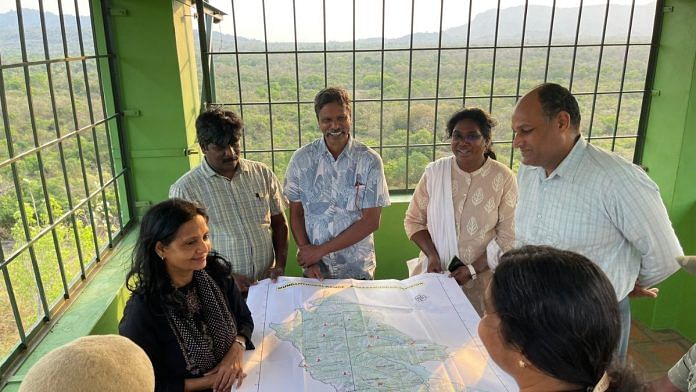Chennai: The Namakkal Kavignar Maligai — considered the power centre of the Tamil Nadu state secretariat — was buzzing with activity on the day ThePrint visited it last month.
On the seventh floor of the building, located in Chennai’s Fort St George campus, the additional chief secretary environment climate change and forests, Supriya Sahu, was busy holding back-to-back meetings with her joint secretaries.
Sahu, who has a strong social media presence, has won many hearts for her posts focused on animal welfare, promoting manjapais (yellow cloth bags) as an alternative to plastic bags, and her constant updates on ‘Arikomban’, the wild elephant who had created panic in Kerala’s Idukki district and later in Tamil Nadu’s Cumbum region in June.
The forest department led by Sahu was on ground on 5 June during the translocation of Arikomban from Cumbum to the Kalakkad Mundanthurai Tiger Reserve in the state’s Tirunelveli and Kanyakumari districts.
Following the translocation, when the public expressed concern over the pachyderm’s well-being after some reports of the elephant not faring well in his new location emerged, Sahu posted updates on her social media pages.
In one such update, she wrote: “Here is an update on wild tusker ‘Arikomban’. As per the information provided by the Field Director, the elephant is healthy and doing extremely well. He has acclimated well and is comfortable in his habitat. Interestingly, there are other herds nearby. Do not believe fake news.”
Update on Wild Tusker Arikomban
Comfortable in his new home in Kalakad Mundanthurai
Tiger Reserve,recouping well, foraging well and exploring the habitat. Frontline staff are monitoring through radio collar and camera traps. As informed by the Field Director. Photo by #TNForest… pic.twitter.com/jNNsaCx7Mv
— Supriya Sahu IAS (@supriyasahuias) June 16, 2023
In March, over five elephants had died of electrocution in the state. During this crisis, too, Sahu and her team had jumped into action. Along with the Tamil Nadu Generation and Distribution Corporation (Tangedco) officials, district collectors and forest department officials conducted door-to-door checks for illegal electrical fences, insulation of wires, and for fences around electrical poles.
“It is important to learn to co-exist,” Sahu said to ThePrint. “We have been promoting that while people are important, animals are important too.”
Since Sahu took over as additional chief secretary, the environment climate change and forest department has successfully notified two new bird sanctuaries, a new elephant reserve, India’s first dugong conservation reserve, the country’s first slender loris conservation reserve and 14 Ramsar wetland sites in Tamil Nadu.
Sahu is described as “inclusive and energetic” by her colleagues. A joint secretary who works with Sahu told ThePrint on condition of anonymity that, “Sahu has a clear idea of what she wants and she ensures that her team delivers it.”
Sahu is also said to be a keen learner with a great understanding of the latest technologies, which she also uses in her work, the joint secretary added.
S. Ramasubramanian, field director, Anamalai Tiger Reserve, told ThePrint, “When there is an issue related to the well-being of animals, she personally checks about their development and keeps the field team motivated.”
“She is lightning fast in taking decisions, releasing funds and following up on issues,” added Ramasubramanian.
Sahu also practices yoga, loves to travel and to connect with nature. “Yoga helps me get into a mode where I have a clarity of thought. It helps me ideate and focus on work,” Sahu told ThePrint.
Also read: Tiffs with ally BJP, optical wins & ground-level cadre challenges — 1 yr of Shinde rebellion
Her work in Nilgiris
A 1991 batch IAS officer, Sahu shot to limelight during her tenure as the district collector of Nilgiris (2000-2003).
Her initiative, Neelamalai Mahalir Nala Thittam (Nilgiri Women’s Welfare Scheme) introduced in 2000, was described as being “well worth replicating in districts across the country” in a report titled ‘Successful governance initiative and best practices’ brought out by the Planning Commission, Government of India, and the United Nations Development Programme (UNDP) in 2003.
As part of Neelamalai Mahalir Nala Thittam, an initiative focused on the welfare of women and children, efforts were made to identify and assist those eligible for rehabilitation. Through this programme, eligible individuals were identified and brought under the welfare net of the state government.
Sahu had thought of bringing in such an initiative back in 1997, when she was the additional collector of Vellore (development). “It was the district’s grievance day,” said Sahu. “The district collector and I were hearing the public’s complaints. A very old man wearing tattered clothes was waiting in the queue. When he was called forward, he placed a crumpled petition and Rs 100 on the table. We asked him what he was doing and he replied that he has been going from pillar to post for his pension and the money was for anyone who could help him avail it,” Sahu told ThePrint.
This incident, she said, changed her.
She knew she had to make the system more accessible for the poor and needy. Upon assuming the role of the collector of Nilgiris in 2000, she initiated a comprehensive house-to-house survey in order to assist the elderly in accessing their entitled pension benefits, as well as ensuring that underprivileged women and children were able to avail of various government schemes they were eligible for.
Another one of Sahu’s focus during her tenure at Nilgiris was to reduce the menace of plastic. The credit for the iconic sign at the district’s entrance — “Enjoy your stay in the Nilgiris, but please do not use plastic” — also goes to her.
It was also under her leadership that Nilgiris district entered the Guinness Book of World Records in 2003. During an event held in the district on 24 June, 2002, 300 people had planted 42,182 trees in a single day, surpassing the previous record held by Canada (34,083 saplings).
Her Central postings include her appointment as the first women vice-president of the Asia-Pacific Broadcasting Union and as the director general of Doordarshan. She also served as the joint secretary in the ministry of information and broadcasting.
Also read: Arrested TN minister Senthil Balaji is Karur strongman, ‘Yes man’ favoured by Jayalalithaa & Stalin
‘Thaila’ ATMs & wildlife conservation forces
As the additional chief secretary environment climate change and forests in the state government, Sahu has kept up her conservation streak — introducing cloth bag ATMs to reduce plastic use, setting up a state crime control bureau to curb illegal poaching and smuggling, and the country’s first marine elite force.
“Manjapai is a metaphor to remind you of your eco-friendly tradition,” said Sahu. “There are about 100 vending machines installed across the state. Our concept is being replicated in other states as well. Indore has placed orders for 40 vending machines from our manufacturers. It’s called a ‘Thaila ATM”.
The ‘Meendum Manjapai’ scheme was launched by Tamil Nadu Chief Minister M.K. Stalin in December 2021. The first manjapai vending machine was installed in Chennai in June last year. According to media reports, around 90 such machines have been installed in the state so far.

According to Sahu, the Union ministry of environment, forest and climate change has also instructed other states to install such vending machines.
Meanwhile, to combat man-animal conflict, Sahu has set up the Tamil Nadu Crime Control Bureau, an 80-member team with four zonal branches.
Among its other tasks, the team also regularly scans social media for posts featuring endangered animals. “We create awareness around not creating trouble for animals. Second, if you do something wrong, which is against the law, we will catch you. We are also focusing on capacity building within the department,” said Sahu.
Tamil Nadu is also the first state in India to set up a “marine elite force”. This marine elite force has fishermen deployed as anti-poaching watchers. “It’s ready. We will be launching it soon. It has got two deep water boats and we have a patrolling team and they’re all recruited from the local fishermen community and trained by the customs and navy,” added Sahu.
The state in association with the World Bank is also set to create a project for marine coastal ecosystem protection, especially focused on wildlife. “We have entered into a new era of conservation. Our focus is on the new generation, local communities, people and politicians to make sure that the future of our animals is safe,” said Sahu.
(Edited by Zinnia Ray Chaudhuri)
Also read: From MGR & Amma to EPS: How ‘Lion of Salem’ Palaniswami made AIADMK crown his own



